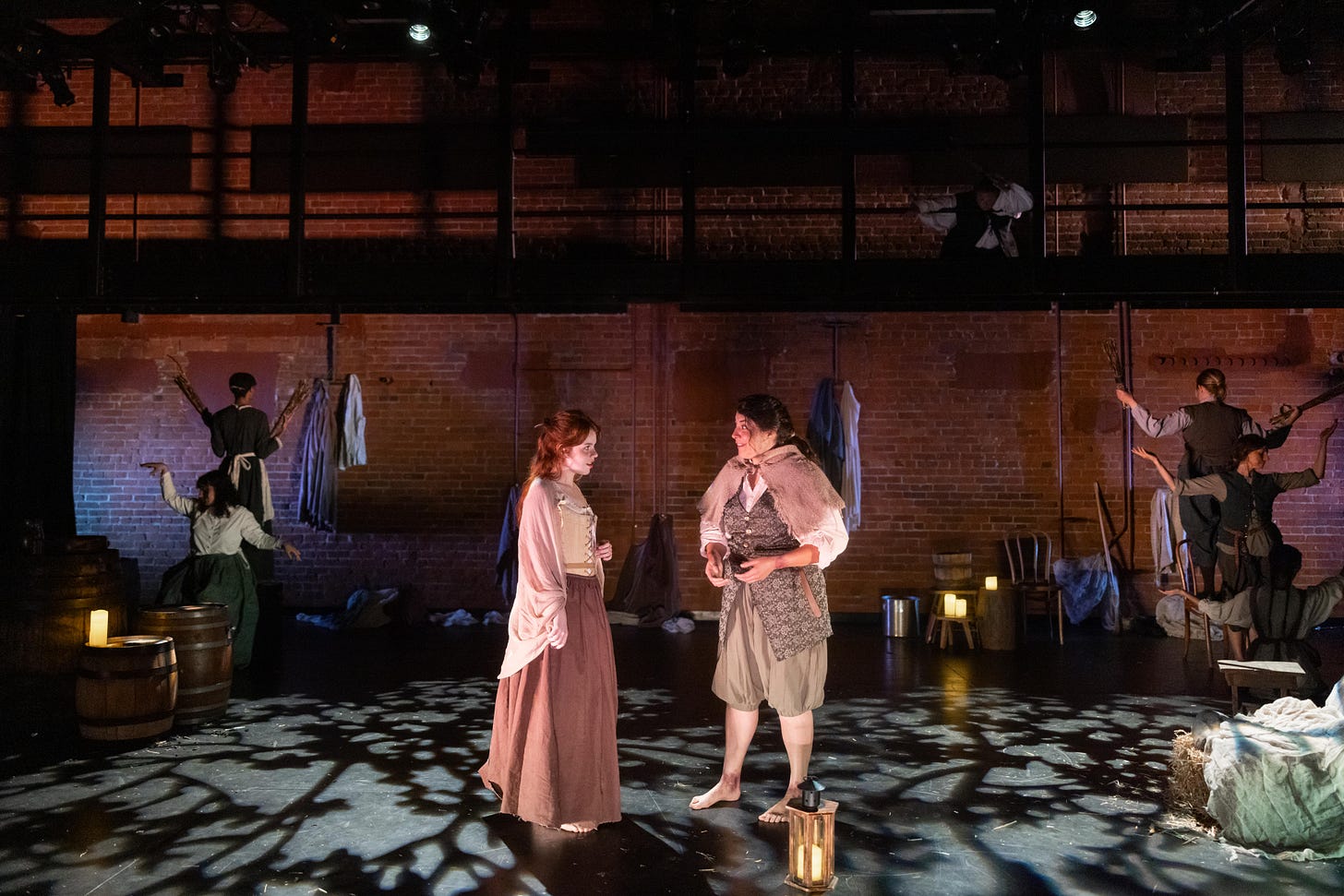She have her goodness now: The Crucible at THT Rep
Despite stumbles, THT Rep's fresh take on a classic proves triumphant.
When describing the events that transpired in Salem between 1692-93, I use the descriptor “Salem Witch Crisis” instead of “Salem Witch Trials.” As we will discover shortly, I feel the term “crisis” more accurately communicates the seriousness of these events.
When taking on a play as renowned and widely produced as The Crucible, every creative team has a very specific set of challenges to face: how does this text apply to the moment in which we are living? How do we convey the facts and truth of the Salem Witch Crisis via a notoriously inaccurate play? Where are the lines between its brilliant strengths and outdated weaknesses, and how can we draw them? The Hanover Theatre Repertory has put a tremendous amount of effort into answering these questions through their own Crucible.
THT Rep’s all-female production is set inside a Salem jail, “where the wrongly accused women of Salem village act out the story of their town’s descent into madness.” It’s a bold choice to be sure, but one that doesn’t often come across. The costuming isn’t firmly grounded in the period, there aren’t any bars or cells on stage, and there is no moment during the production where the device is acknowledged in explicit terms. The only way to know for certain that the play is set inside a jail is to be told so, and even then it doesn’t fully read. Thankfully the cast and crew have another twist on the material that succeeds in every sense of the word.

The decision to utilize an all female cast for The Crucible is inspired. Misogyny plays a huge part in both Miller’s script and the real-life happenings of the Salem Witch Crisis—of the nineteen people killed, thirteen were women. As director Livy Scanlon acknowledges in her (very eloquent) director’s note, The Crucible has been subject to a lot of reexamination over the years. The valid points Miller was making about McCarthyism and the Red Scare can easily be obscured by the fact that the male main character spends all his time talking down to a bunch of young girls, some of whom he has abused. THT Rep’s casting helps to eliminate misogynistic implication, and it manages to do this without betraying the integrity of the original text. Without gender looming over the proceedings, The Crucible can focus concretely on what it is best at: the struggle between right and wrong.
It helps that the all-female twist is bolstered by a wonderful cast. Meri Stypinski, a comedic highlight from Twelfth Night, is solemnity embodied as Elizabeth Proctor. Jaclyn Morrison’s Abigail Williams could do with some restraint, but ultimately she demonstrates the makings of a great actor—as does Alyssa Morales’ deeply sympathetic Mary Warren. Julie Nelson brings much-needed humor to the proceedings as Giles Correy while preserving his integrity as a historical figure. As for John Proctor…Alexa Cadete’s performance marks the first time this author has ever used the phrase “tour de force.” John Proctor is a contradictory man, at once a paragon of truth and an abusive prick with a superiority complex. Cadete embraces his contradictions as a condition of being human. She is an avatar for all the deepest and rawest emotions, and her path to navigate them towards a righteous end helps to elevate the piece all the more.
The Salem Witch Crisis is often treated as a joke these days. People talk about how “silly” the accusations were, how any kind of proof was no proof at all, how goofy it must have been to watch people pretending to have visions on the witness stand. They hand wave it as people from the olden times being stupid and immediately make their way towards the gift shop to buy a t-shirt with a witchy slogan on it. Let’s be clear: there is nothing funny or endearing about the Salem Witch Crisis. Over a dozen people were accused of serious, baseless crimes. In attempting to remain honest and hold onto their integrity, they were deprived of both. Ultimately, nineteen innocent people were murdered for sport. I dare you to find the humor in that.
This is the thing that elevates The Crucible above all else. It’s clear from the jump that everyone involved in the project went into it with the utmost respect for who they were representing. They approached it as a multilevel being and took care to go through each one by one. One is Miller’s original cautionary tale about mob mentality; the other is a plea for truth in today’s age of misinformation; the final is an elegy for those nineteen innocent people. THT Rep’s production is not without its flaws, but it succeeds at the most important thing it could possibly do: taking its own history seriously.
The Crucible runs until October 6th, 2024, at the Jean McDonough Arts Center’s BrickBox Theatre. Tickets available here.




